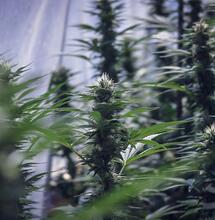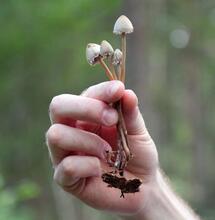Reactionary Bans of & Synthetic Marijuana' Could Limit Scientific Research

Thirty-four states have already banned the sale of products containing synthesized drugs
Thirty-four states have already banned the sale of products containing synthesized drugs
SOURCE: www.rawstory.com AUTHOR: Stephen C. Webster So-called "synthetic marijuana" mixtures of synthesized chemicals and plant matter sent nearly 12,000 people to emergency rooms across the U.S. in 2010, according to a study released Tuesday - a statistic that could encourage lawmakers to limit synthetic chemicals associated with the products even further. Statistics released by the government's Drug Abuse Warning Network (DAWN) found that chemicals known to be additives in products like "Spice" and "K2″ were the cause of 11,406 emergency room visits in 2010. Scary as it sounds, that number is far fewer than the 1,345,645 emergency room patients admitted for misuse or abuse of prescription drugs. It is also less than the 461,028 emergency room visits sparked by marijuana, which is known to be much less toxic than other drugs of abuse. Nevertheless, news of the adverse effects caused by chemicals in fake pot have prompted a total of 34 states so far have banned the sale of products containing synthesized drugs similar to the psychoactive ingredient of marijuana, even though numerous varieties were once widely available at retail across the nation. Despite the bans, numerous new synthetic cannabinoids began appearing shortly after the Drug Enforcement Agency issued its list of newly controlled substances, forcing individual states to become even more specific about what they were prohibiting from sale. Flying in the face of that effort, numerous varieties of "synthetic marijuana" are still available to this very day, complete with packaging that declares it does not contain substances banned by the DEA. New Jersey, however, is among several states innovating on that front. Officials there announced last week that they were implementing one of the nation's most specific cannabinoid bans yet, with a regulation (PDF) that describes down to the molecular structure exactly what they now consider to be illegal.
"We were the fourth state to have a comprehensive ban of synthetic marijuana that covers all possible variants of it," a spokesperson for the New Jersey Attorney General's office told Raw Story. "We looked really closely at what they've done in other states and looked at how their language named specific chemicals, but also the catch-all language... banning any other compound that affects the brain similarly to marijuana."
New Jersey's ban, which is likely to be replicated in other states, describes in great detail numerous synthetic cannabinoids on its list of newly "controlled dangerous substances," including one that's sparked interest in the potential for healing damaged brains.
The synthetic cannabinoid HU-210, which the DEA says is "structurally and pharmacologically similar to" the psychoactive ingredient in marijuana, was the subject of a peer-reviewed article in The American Society for Clinical Investigation, published in 2005. Researchers discovered that it actually caused brain cells to regenerate while reducing anxiety and depression. Because of the bans, however, no research may be carried out on HU-210 or any other synthetic cannabinoid without explicit permission from the DEA.
New Jersey, however, is among several states innovating on that front. Officials there announced last week that they were implementing one of the nation's most specific cannabinoid bans yet, with a regulation (PDF) that describes down to the molecular structure exactly what they now consider to be illegal.
"We were the fourth state to have a comprehensive ban of synthetic marijuana that covers all possible variants of it," a spokesperson for the New Jersey Attorney General's office told Raw Story. "We looked really closely at what they've done in other states and looked at how their language named specific chemicals, but also the catch-all language... banning any other compound that affects the brain similarly to marijuana."
New Jersey's ban, which is likely to be replicated in other states, describes in great detail numerous synthetic cannabinoids on its list of newly "controlled dangerous substances," including one that's sparked interest in the potential for healing damaged brains.
The synthetic cannabinoid HU-210, which the DEA says is "structurally and pharmacologically similar to" the psychoactive ingredient in marijuana, was the subject of a peer-reviewed article in The American Society for Clinical Investigation, published in 2005. Researchers discovered that it actually caused brain cells to regenerate while reducing anxiety and depression. Because of the bans, however, no research may be carried out on HU-210 or any other synthetic cannabinoid without explicit permission from the DEA.
 "A number of chemists and scientists I've talked to expressed a lot of concern about passing these sweeping bans, which make synthetic cannabinoids accessible for research purposes," Grant Smith, policy coordinator at the Drug Policy Alliance, told Raw Story. "It [also] seems like [lawmakers] are trying to get ahead of entrepreneurs coming out with new chemicals."
Still, New Jersey Attorney General Jeffrey S. Chiesa sees things differently. "These synthetic poisons, once offered as a so-called ‘legal high' by shady retailers, are now permanently off the market in New Jersey - and the numbers indicate our ongoing ban has led to a decline in their reported use," he said in a media advisory. "These drugs have grown in popularity nationwide, despite their alarming and catastrophic side effects. Today they are permanently on record as being just as illegal as cocaine or heroin."
Smith, however, cautioned that such laws will ultimately result in people being falsely arrested if officers suspect they may have a synthetic cannabinoid, even though products containing them are often sold as incense and the presence of such a drug requires laboratory analysis.
"It means a lot more people will be criminalized," he said. "If law enforcement finds something they believe is a banned chemical, under legislation like this they could bring that person in without any scientific input as to whether that's even necessary."
"A number of chemists and scientists I've talked to expressed a lot of concern about passing these sweeping bans, which make synthetic cannabinoids accessible for research purposes," Grant Smith, policy coordinator at the Drug Policy Alliance, told Raw Story. "It [also] seems like [lawmakers] are trying to get ahead of entrepreneurs coming out with new chemicals."
Still, New Jersey Attorney General Jeffrey S. Chiesa sees things differently. "These synthetic poisons, once offered as a so-called ‘legal high' by shady retailers, are now permanently off the market in New Jersey - and the numbers indicate our ongoing ban has led to a decline in their reported use," he said in a media advisory. "These drugs have grown in popularity nationwide, despite their alarming and catastrophic side effects. Today they are permanently on record as being just as illegal as cocaine or heroin."
Smith, however, cautioned that such laws will ultimately result in people being falsely arrested if officers suspect they may have a synthetic cannabinoid, even though products containing them are often sold as incense and the presence of such a drug requires laboratory analysis.
"It means a lot more people will be criminalized," he said. "If law enforcement finds something they believe is a banned chemical, under legislation like this they could bring that person in without any scientific input as to whether that's even necessary."
S
Soft Secrets



